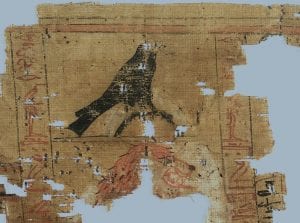Papyrus for the People – engaging the public through storytelling
By ucypndo, on 28 July 2017
![]() Written by Natasha Downes, Media Relations Manager, UCL
Written by Natasha Downes, Media Relations Manager, UCL
Divorce papers, tax documents, and a gentlemen that listed his days and whether they were good, bad or both – these are a few examples of the fascinating papyri that are on display at the Petrie Museum of Egyptian Archaeology, part of UCL Culture.

Detail from a fragmentary papyrus scroll.
This week I attended a Papyrus Storytelling event held at the museum, where families and adults were invited to explore fragments of stories from ancient Egypt preserved on papyrus.
Helping to bring the stories of ancient Egypt to life, professional puppeteer Allison DeFrees from Puppet Story led a puppet making workshop for the kids, and parents, to delve deeper into the museums artefacts.
Popular amongst parents looking for something a bit different to do in the school holidays, one family explained that Egypt has become a kind of passion project after they visited the Swansea Egypt Centre.
The Petrie museum is located at the heart of the UCL campus and the artefacts on display, most of which were excavated by English Egyptologist Flinders Petrie, illustrate life in the Nile valley from prehistory through the time of the pharaohs, the Ptolemaic, Roman and Coptic periods to the Islamic period.
I was fortunate enough to have Louise Bascombe, curatorial assistant at the museum, who used to work at the Horniman Museum in South London, talk me through their collection. Some 80,000 objects in total, including over 500 papyri (a material similar to thick paper that was used in ancient Egypt as writing surface) and 1600 ostraca (historic fragments of pottery or small pieces of stone that have writing scratched into them).
What makes the Petrie special is the access that you get to wonderful experts and passionate Egyptologists that you wouldn’t often find at a larger museum. There were plenty of opportunities for the families involved in the workshop to ask questions about life in ancient Egypt.
The storytelling workshop forms part of a major push to improve understanding and accessibility of the Petrie collection. Supported by a grant from the Arts Council England, the collection of written texts are set to get the special attention they deserve, both in terms of preservation and how they are displayed. The project will also include an upgrade of its online catalogue, a searchable database with all 80,000 of its artefacts on it.
The Petrie may be small but it houses one of the largest collections of Egyptian and Sudanese artefacts anywhere in the world. For anyone interested in exploring ancient history and archaeology, the Petrie is definitely worth a visit.
 Close
Close


 Set among many enchanting and unusual artefacts, a timely post-Halloween showing of Kenneth Anger’s Lucifer Rising felt perfectly at home at
Set among many enchanting and unusual artefacts, a timely post-Halloween showing of Kenneth Anger’s Lucifer Rising felt perfectly at home at